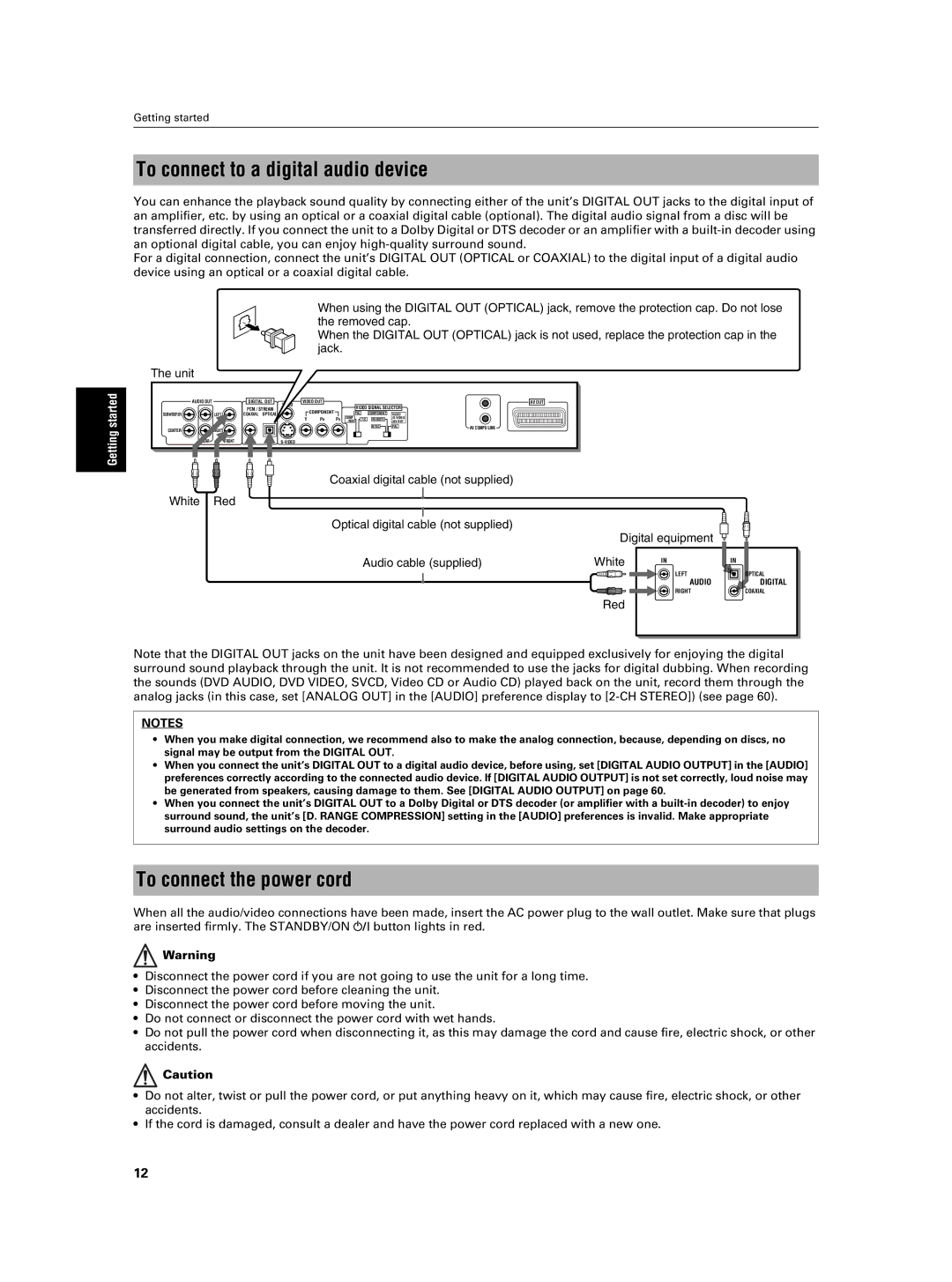
Getting started
Getting started
To connect to a digital audio device
You can enhance the playback sound quality by connecting either of the unit’s DIGITAL OUT jacks to the digital input of an amplifier, etc. by using an optical or a coaxial digital cable (optional). The digital audio signal from a disc will be transferred directly. If you connect the unit to a Dolby Digital or DTS decoder or an amplifier with a
For a digital connection, connect the unit’s DIGITAL OUT (OPTICAL or COAXIAL) to the digital input of a digital audio device using an optical or a coaxial digital cable.
When using the DIGITAL OUT (OPTICAL) jack, remove the protection cap. Do not lose the removed cap.
When the DIGITAL OUT (OPTICAL) jack is not used, replace the protection cap in the jack.
The unit
AUDIO OUT | DIGITAL OUT | VIDEO OUT |
|
|
|
|
| AV OUT | |
| PCM / STREAM | VIDEO |
|
|
| VIDEO SIGNAL SELECTOR |
| ||
|
| COMPONENT |
|
|
| ||||
SUBWOOFER | COAXIAL OPTICAL |
|
| COMP. | PAL | COMPONENT | VIDEO |
| |
|
| Y | PB | PR | Y/C | REMOTE |
| ||
|
| /RGB | /AV OUT |
| |||||
CENTER |
|
|
|
|
|
| NTSC | PAL | AV COMPU LINK |
|
|
|
|
|
|
|
| ||
|
|
|
|
|
|
|
|
| |
FRONT |
|
|
|
|
|
|
|
| |
Coaxial digital cable (not supplied)
White Red
Optical digital cable (not supplied)
Digital equipment
Audio cable (supplied) | White | IN | IN |
|
| ||
|
| LEFT | OPTICAL |
|
| AUDIO | DIGITAL |
|
| RIGHT | COAXIAL |
| Red |
|
|
Note that the DIGITAL OUT jacks on the unit have been designed and equipped exclusively for enjoying the digital surround sound playback through the unit. It is not recommended to use the jacks for digital dubbing. When recording the sounds (DVD AUDIO, DVD VIDEO, SVCD, Video CD or Audio CD) played back on the unit, record them through the analog jacks (in this case, set [ANALOG OUT] in the [AUDIO] preference display to
NOTES
•When you make digital connection, we recommend also to make the analog connection, because, depending on discs, no signal may be output from the DIGITAL OUT.
•When you connect the unit’s DIGITAL OUT to a digital audio device, before using, set [DIGITAL AUDIO OUTPUT] in the [AUDIO] preferences correctly according to the connected audio device. If [DIGITAL AUDIO OUTPUT] is not set correctly, loud noise may be generated from speakers, causing damage to them. See [DIGITAL AUDIO OUTPUT] on page 60.
•When you connect the unit’s DIGITAL OUT to a Dolby Digital or DTS decoder (or amplifier with a
To connect the power cord
When all the audio/video connections have been made, insert the AC power plug to the wall outlet. Make sure that plugs are inserted firmly. The STANDBY/ON ![]()
![]() button lights in red.
button lights in red.
![]() Warning
Warning
•Disconnect the power cord if you are not going to use the unit for a long time.
•Disconnect the power cord before cleaning the unit.
•Disconnect the power cord before moving the unit.
•Do not connect or disconnect the power cord with wet hands.
•Do not pull the power cord when disconnecting it, as this may damage the cord and cause fire, electric shock, or other accidents.
![]() Caution
Caution
•Do not alter, twist or pull the power cord, or put anything heavy on it, which may cause fire, electric shock, or other accidents.
•If the cord is damaged, consult a dealer and have the power cord replaced with a new one.
12
